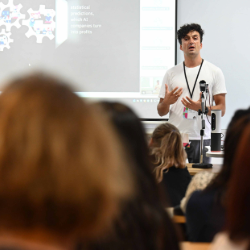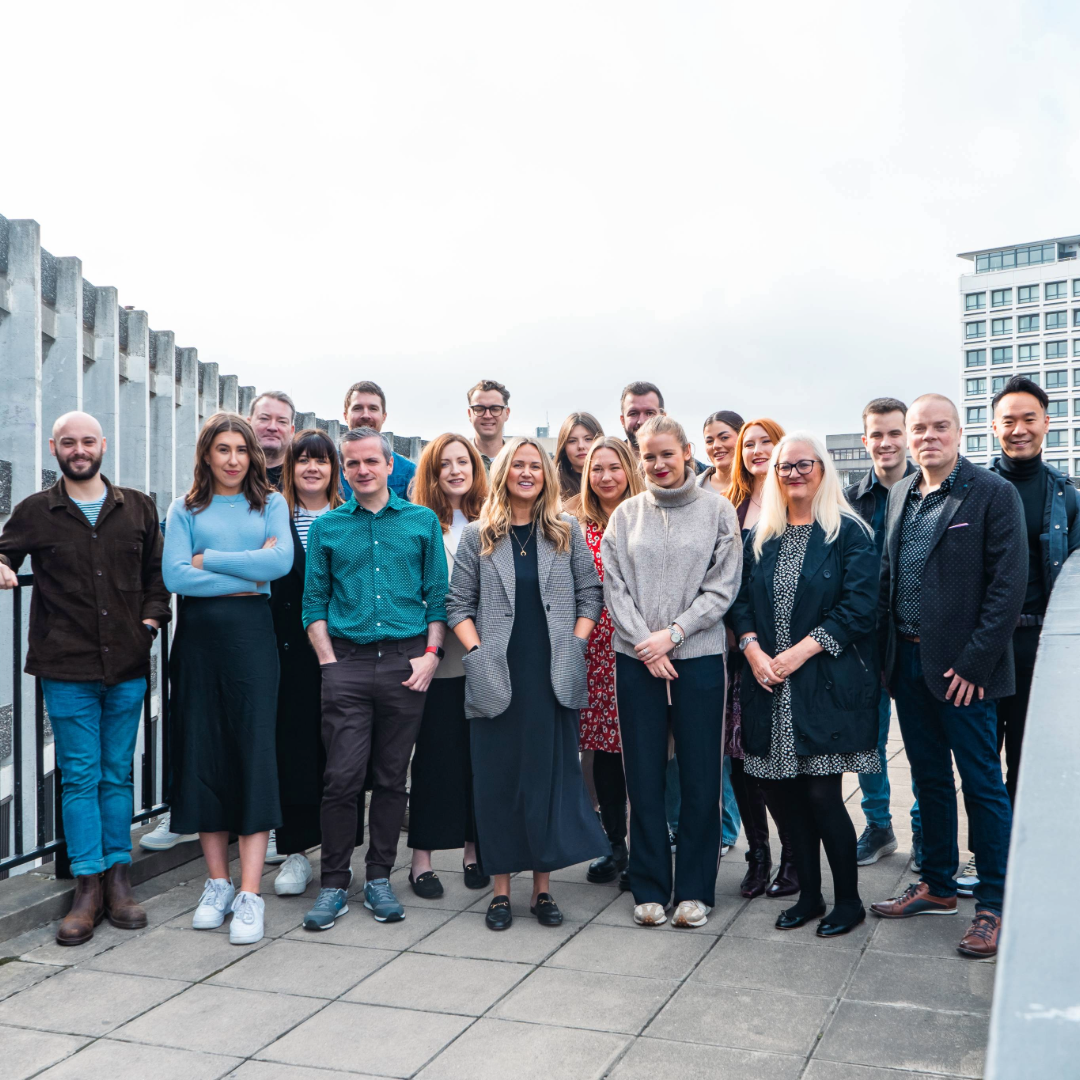-
Study
Study
Interested in studying at Northumbria? With 31,500 students, Northumbria is one of the largest universities in the country, offering courses on either a full-time, part-time or distance learning basis.
Discover more-
Undergraduate
- Undergraduate Study Degree
- Undergraduate Open Day & Events
- Application Guides
- Northumbria University UCAS Exhibitions
- Foundation Years
- Undergraduate Fees & Funding
- School & College Outreach
- Continuing Professional Development
-
Postgraduate
- Postgraduate Study Degree
- Postgraduate Research Degrees
- Postgraduate Open Days and Events
- Postgraduate Fees & Funding
- Flexible Learning
- Thinking about a Masters?
- Continuing Professional Development
- Change Direction
-
Student Life
- The Hub - Student Blog
- Accommodation
- Life in Newcastle
- Support for Students
- Careers
- Information for Parents
- Students' Union
- Northumbria Sport
-
-
International
International
Northumbria’s global footprint touches every continent across the world, through our global partnerships across 17 institutions in 10 countries, to our 277,000 strong alumni community and 150 recruitment partners – we prepare our students for the challenges of tomorrow. Discover more about how to join Northumbria’s global family or our partnerships.
Discover more-
Applying to Northumbria
- European Union
- Our London Campus
- Northumbria Pathway
- International Events
- Entry Requirements
- Agent Network
-
Northumbria Language Centre
- Faculty Requirements
- Acceptable English Requirements
- Pre-Sessional English and Study Skills
- Academic Language Skills Programmes (ALS)
-
International Fees, Funding & Scholarships
- International Undergraduate Fees
- International Undergraduate Funding
- International Masters Fees
- International Masters Funding
- International Postgraduate Research Fees
- International Postgraduate Research Funding
- International Money Matters
-
Life at Northumbria
- International student support
- The Hub - Student Blog
- Careers
-
International Mobility
- Current Northumbria Students
- Incoming Exchange Students
-
-
Business
Business
The world is changing faster than ever before. The future is there to be won by organisations who find ways to turn today's possibilities into tomorrows competitive edge. In a connected world, collaboration can be the key to success.
Discover more -
Research
Research
Northumbria is a research-rich, business-focused, professional university with a global reputation for academic quality. We conduct ground-breaking research that is responsive to the science & technology, health & well being, economic and social and arts & cultural needs for the communities
Discover more -
About Us
-
About Northumbria
- Our Strategy
- Our Staff
- Place and Partnerships
- Student Profiles
- Alumni Profiles
- Leadership & Governance
- Academic Departments
- University Services
- History of Northumbria
- Contact us
- Online Shop
-
-
Alumni
Alumni
Northumbria University is renowned for the calibre of its business-ready graduates. Our alumni network has over 237,000 graduates based in 178 countries worldwide in a range of sectors, our alumni are making a real impact on the world.
Discover more - Work For Us
What will I learn on this module?
This module aims to build on your learning from the Year 1 “Academic Information Skills and Critical Reflection” module (SW4005). It aims to support you to move from being able to locate and make an initial critical appraisal of knowledge towards a deeper understanding of different forms of research evidence and their value for social work practice. The curriculum will therefore focus on developing your skills in evaluating the quality and relevance of research. This is with a view to supporting your ability to inform your future practice with high quality and up to date evidence and engage in effective lifelong learning. The assignment will invite you to explore and critically appraise research-based knowledge in an area of your interest relevant to social work practice.
How will I learn on this module?
You will learn through lectures, seminars, peer group and collaborative learning, independent and self-directed study and library-based work.
We will identify a range of tasks for you to complete week to week. Sometimes these are learning activities to bring with you for the next seminar, sometimes learning to undertake for the next session. These are focussed tasks aimed to help you to work towards the summative task for this module.
How will I be supported academically on this module?
You will be supported in a variety of ways during the lectures and seminars. These will include feedback from tutors and peer groups during the lectures and seminars. In addition, the module leader and seminar tutors will respond to questions, preferably via the module’s discussion board on the Blackboard Ultra e-Learning (eLP) site so that the whole group can benefit.
What will I be expected to read on this module?
All modules at Northumbria include a range of reading materials that students are expected to engage with. The reading list for this module can be found at: http://readinglists.northumbria.ac.uk
(Reading List service online guide for academic staff this containing contact details for the Reading List team – http://library.northumbria.ac.uk/readinglists)
What will I be expected to achieve?
At the end of the module you will be able to:
Knowledge & Understanding:
1. Demonstrate an understanding of key issues in research and knowledge generation, including the ethical obligations of the researcher.
2. Describe and explore the current state of knowledge about a relevant topic.
Intellectual / Professional skills & abilities:
3. Prepare to make decisions through the identification and gathering of information from more than one source and, with support, question the reliability and validity of this information.
4.Consider how evidence may be used to inform judgement and decisions in practice situations.
Personal Values Attributes (Global / Cultural awareness, Ethics, Curiosity) (PVA):
5. Recognise the importance of applying imagination, creativity, and curiosity to practice.
How will I be assessed?
Formative assessment
Your formative assessment is a verbal group presentation of a set of research articles relevant to an aspect of social work of the group’s choice. As a group you will need to present how you searched for the research, evaluate the strengths and weaknesses of each piece of research, and identify what the research contributes to your understanding of social work practice. You will receive verbal feedback from your peers and your tutor which will help your preparations for your summative assessment.
(MLO 2, 3, 4, 5).
Summative assessment
This is a 2,000-word critical research review which is submitted through Turnitin. You will need to identify several research articles relevant to an aspect of social work of your choice, using advanced search techniques. You will need to evaluate the quality of the identified pieces of research and discuss what the research contributes to your understanding of this aspect of social work practice. The assignment constitutes 100% of the module mark. You will be provided with written feedback through Turnitin.
(MLO 1, 2, 3, 4, 5).
Pre-requisite(s)
SW4000, SW4001, SW4002, SW4003, SW4004, SW4005
Co-requisite(s)
SW5000, SW5001, SW5002, SW5003.
Module abstract
This module builds on learning from the Year 1 module “ Academic Information Skills and Critical Reflection” (SW4005) towards a deeper understanding of the contribution research knowledge can make to social work practice through an understanding of the research process, and alongside this, further developing your ability to appraise the quality of different forms of evidence. The curriculum will therefore focus on developing your skills in finding and reading research, in evaluating the quality and relevance of research findings, and in thinking about how you might beneficially draw on research findings in practice. By the end of the module, you will be a more confident reader and user of research knowledge and will be able to critically reflect on the implications of different ways of using research evidence in social work practice.
Course info
UCAS Code L503
Credits 20
Level of Study Undergraduate
Mode of Study 3 years Full Time
Department Social Work, Education and Community Wellbeing
Location Coach Lane Campus, Northumbria University
City Newcastle
Start September 2024 or September 2025
All information is accurate at the time of sharing.
Full time Courses are primarily delivered via on-campus face to face learning but could include elements of online learning. Most courses run as planned and as promoted on our website and via our marketing materials, but if there are any substantial changes (as determined by the Competition and Markets Authority) to a course or there is the potential that course may be withdrawn, we will notify all affected applicants as soon as possible with advice and guidance regarding their options. It is also important to be aware that optional modules listed on course pages may be subject to change depending on uptake numbers each year.
Contact time is subject to increase or decrease in line with possible restrictions imposed by the government or the University in the interest of maintaining the health and safety and wellbeing of students, staff, and visitors if this is deemed necessary in future.
Useful Links
Find out about our distinctive approach at
www.northumbria.ac.uk/exp
Admissions Terms and Conditions
northumbria.ac.uk/terms
Fees and Funding
northumbria.ac.uk/fees
Admissions Policy
northumbria.ac.uk/adpolicy
Admissions Complaints Policy
northumbria.ac.uk/complaints












.png?h=162&w=275&modified=20240508204039&hash=E7730891F70B0846DBED986B881F8605)

